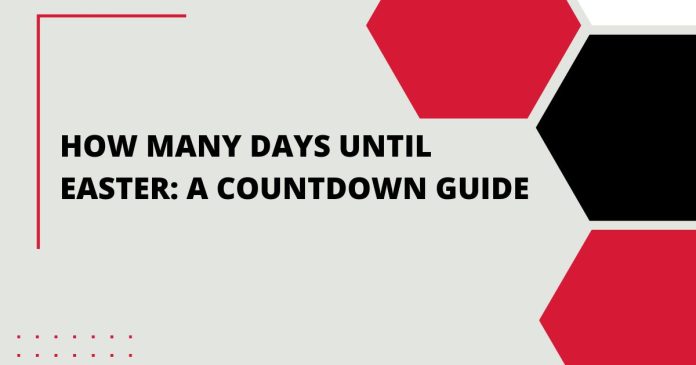Easter, a widely celebrated Christian holiday, marks the resurrection of Jesus Christ from the dead. It’s a time of reflection, renewal, and joy for believers around the world. But have you ever wondered, “How many days until Easter?” Whether you’re eagerly anticipating the holiday or simply curious, this article will guide you through the countdown and shed light on the significance of this annual event.
Table of Contents
- Introduction
- The Calculation of Easter
- Historical Origins of Easter
- Symbolism and Traditions
- Easter Preparations
- Easter Eggs and Their Meaning
- Easter Bunny: Friend or Foe?
- Different Dates for Easter
- Easter Celebrations Around the World
- The Significance of Lent
- Easter and Passover: A Connection
- Easter Feast and Culinary Delights
- The Joy of Easter Sunday
- Easter’s Message of Hope
- Conclusion
Introduction
Easter, one of the most important festivals in Christianity, is a time of commemorating the resurrection of Jesus Christ. This holiday holds profound significance, symbolizing new beginnings and spiritual rebirth.
The Calculation of Easter
Determining the date of Easter isn’t as straightforward as checking a fixed calendar date. Instead, it follows a complex formula based on the lunar calendar and the vernal equinox. This calculation often leads to Easter falling on different dates each year.
Historical Origins of Easter
Easter’s origins trace back to ancient pagan celebrations of spring. Over time, these festivities merged with the Christian observance of Jesus’s resurrection, creating the modern Easter holiday.
Symbolism and Traditions
Easter is rich in symbolism, with eggs representing new life and bunnies symbolizing fertility. Various traditions, such as egg hunting and the Easter parade, have evolved over centuries.
Easter Preparations
The days leading up to Easter involve spiritual preparations for many Christians. It’s a time of self-reflection, repentance, and prayer, often observed during the season of Lent.
Easter Eggs and Their Meaning
Easter eggs have a deep connection to this holiday. They are often dyed in vibrant colors to represent the shedding of Jesus’s blood, while the cracking of the egg symbolizes his resurrection.
Easter Bunny: Friend or Foe?
The Easter bunny, although not a religious figure, has become synonymous with the holiday. It’s a character loved by children, often associated with the delivery of Easter eggs and treats.
Different Dates for Easter
Did you know that Eastern Orthodox Christianity celebrates Easter on a different date than Western Christianity? This disparity is due to variations in calendar systems and historical practices.
Easter Celebrations Around the World
Easter is celebrated with diverse customs globally. From the solemn processions in Spain to the joyful “egg rolling” tradition in the United States, this holiday takes on various forms.
The Significance of Lent
Lent, the 40-day period leading up to Easter, holds deep spiritual significance. It’s a time of fasting, reflection, and self-discipline for Christians as they prepare to commemorate Jesus’s sacrifice.
Easter and Passover: A Connection
Easter often coincides with the Jewish holiday of Passover. This connection is rooted in history, as Jesus’s Last Supper is believed to have been a Passover meal.
Easter Feast and Culinary Delights
Easter Sunday is a time for feasting and enjoying special dishes. From roast lamb to hot cross buns, culinary traditions play a central role in the celebrations.
The Joy of Easter Sunday
Easter Sunday is the pinnacle of the holiday, celebrating the resurrection of Jesus. Churches hold special services, and families come together to rejoice in the message of hope and renewal.
Easter’s Message of Hope
At its core, Easter carries a message of hope, renewal, and redemption. It reminds believers that even in the darkest moments, there is the promise of a new beginning.
Conclusion
As you eagerly anticipate the upcoming Easter celebration, take a moment to reflect on its historical origins, symbolism, and profound meaning. It’s a time of unity, love, and hope that transcends cultures and generations.
FAQs
- When is Easter typically celebrated? Easter falls on varying dates each year, typically between late March and late April.
- Why do Eastern and Western Christianity celebrate Easter on different dates? The difference arises from distinct calendar systems and historical practices.
- What is the significance of the Easter egg? The egg symbolizes new life and the resurrection of Jesus, with the cracked shell representing his emergence from the tomb.
- How long is the Lenten period? Lent lasts for 40 days, symbolizing Jesus’s 40 days of fasting in the desert.
- What is the connection between Easter and Passover? Easter and Passover are connected through historical events, as Jesus’s Last Supper is thought to have been a Passover meal.

